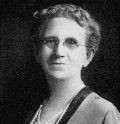I dreamed a dream and the dream was true, But the truth was old, though it looked like new.
Sepia the maid who was born on the sea And Silica the youth who was born on the land, Plotted together how they could withhold from the grasp of disease their enemy old Their common friend, the child of man. Thus runs the legend that came to me.
The legend is true as truth is true. As it came to me, I’ll give it to you.
The Sepia maid had dark brown hair, a yellow saddle crossed nose and cheek, She was inclined to cry without knowing why, was gloomy and sad and thought she would die. Those she loved best, at a distance she’d keep, And at times with it all, was as cross as bear.
Do you list to this legend? ’tis true indeed You’ll wish you had listened when help you need.
On Silica’s head were curls of gold, His eyes were as blue as heaven’s own blue, He was anxious and restless and tears would come when thinking of work, he knew must be done, which work he was sure that he could not do, Though he’d done the same often in days of old. Where I found this legend; you want to know? From dream land it came in the long ago.
So Sepia sallow and Silica fair Planned and brooded early and late, All for the good of the child of man. It’s long, long years since their task began, They’ve accomplished much, but their task was great. They’ll accomplish more the faithful pair.
Now hear what they did as it was told to me, By the whispering wind that came up from the sea.
Each built a castle tall and vast. Sepia’s castle stood on a hilltop high. While Silica’s stood below on the shore, ‘Mid the dash of the storm and the ocean’s roar. Sepia’s castle seemed resting against the sky, Which o’er it a quieting influence cast.
This legend is every word of it true, To remember it all would be better for you.
To the hilltop went those whom Sepia befriend,
Her guests were better from walking about. Violent exertion did them good. They were happy indeed in their solitude, For they felt quite alone with nature when out, And they wished such conditions never would end. The wind vouched for truth of this story this morn,
When he came from the mountain at earliest dawn. Silica’s guests could never the mountains climb, No violent exertion would do for them. When they walked or stooped or moved around, A great aggravation of symptoms was found, And they had no desire to try it again. Lest worse aggravations they should find.
The waves told me this, when they dashed on shore. And said if I’d listen, they’d tell me much more.
Sepia’s friends were worse morn, evening and night. Silica’s friends grew worse at the self same time.
To be worse in the evening and night and morn, Was the manner to which most guests were born, And they follow this custom, you’ll surely find, When you also are working to make them all right.
This story is true. If you have any doubt, You know where to look, the truth to find out.
The guests in both castles, when warm were better, And both were worse with a change of weather. Sepia’s headache improved in the open air, While silica’s was worse when wandering there. They agreed there in spirit as well as the letter. On the question of draft, they voted together, They agreed there in spirit as well as the letter. This legend was whispered by suffering man All down through the ages since suffering began.
Silica’s guests-feet were offensive and sores, Made so by excessive, offensive foot sweats. Should they wash their feet forever and a day, They could never wash that odor away. This self same condition in Sepia was met, Nor would it depart after scrubbings galore.
This story was lived before it was told, And that is one reason we know it is old.
Silica’s flushes of heat were frequent and short, And principally came in the face and the head. Sepia felt her flushes of heat ascend, And she knew that soon in a sweat they’d end. She flushed all over, till her face was red, And She wished she knew how the flushes to abort.
This story is true as truth is true, As it was told to me I tell it to you.
Sepia’s children were thin, had the old man face, Their bellies were big and dry was their skin. Silica’s babies’ heads were large, but their bodies small, They sweat much on the head, but that was all. If all the world’s children were half as thin, The outlook would be very bad for the race. Here’s the legend. Take it for what it is worth, But don’t hold me responsible at all for its birth.


